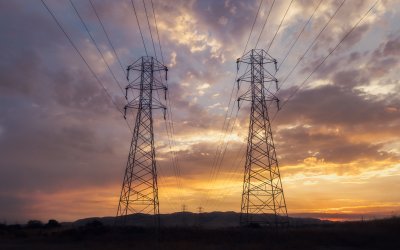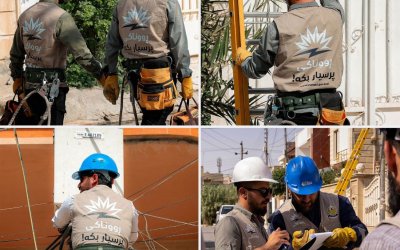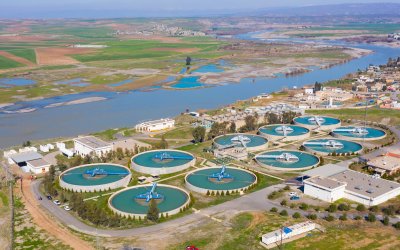العربية
Starting in the spring months of 2024, images of overflowing dams and flooded rivers dominated Iraqi TV channels and social media, a result of this year’s abundant rains. Despite the much-needed relief provided by this unusually rainy season, experts are skeptical about the long-term sustainability of this state of affairs. The past 4 years of consecutive drought seasons have pushed Iraqis to question the government’s strategies in dealing with protracted water scarcity. The damage of these consecutive drought seasons has cut-down agricultural production and deprived many Iraqis of their basic water rights. These effects have had disastrous impacts especially on climate vulnerable communities, driving livelihood deterioration, displacement, and grievances over services. In addition to these impacts, water scarcity and mismanagement have left chronic scars on Iraq’s rich ecosystems. Around 250 square kilometers of arable land are lost annually, with 60% of Iraq’s symbolic palms disappearing during the past 20 years. Moreover, many natural lakes have completely drained, marshes massively shrank, and species such as marsh buffaloes and migratory birds are rapidly on decline.
How do Iraqi officials understand these challenges and the pathways forward? Over the past two years, our research team at IRIS has conducted interviews with government officials in relevant ministries to gain an understanding of their positions, in addition to attending relevant conferences and meetings among Iraqi policymakers. Here I will focus on conversations I had at the 4th Baghdad International Water Conference (BIWC) earlier this year, as it was a good example of the kinds of cross-governmental dialogue shaping developments in water policy in Iraq. The conference underscored the growing sense among government actors that they must restore trust with the public on securing water resources for the long-term.
The government must prioritize efficient water management, ecosystem restoration, and climate resilience, ensuring long-term socioeconomic stability and environmental sustainability.
There is no doubt that water and environmental policies impact the basic livelihoods of Iraqis. These impacts include access to drinking water and sanitary needs, as well as the source of income and way of life of many agrarian and marsh communities. At the same time, the profound and multifaceted nature of Iraq's environmental challenges require economic policies and financial resources to mitigate these impacts and adapt to extreme climatic events. For example, the government needs to invest in water treatment infrastructure and use its existing water resources more efficiently. Moreover, the decline in agricultural output and its effects on food security and livelihoods require economic policies that incentivize farmers to transition towards sustainable farming practices. The government must prioritize efficient water management, ecosystem restoration, and climate resilience, ensuring long-term socioeconomic stability and environmental sustainability.
Necessity is the Mother of Invention
Iraqi officials have long pointed fingers to upstream riparian states, namely Türkiye and Iran, for exploiting their geographic positions to deprive Iraq its water shares while paying less attention to Iraq’s internal water management. But interviews with government stakeholders indicate that this emphasis may be changing. Years of failed negotiations have showed Iraqi policymakers that investing in internal water management is no longer avoidable. After all, Türkiye often blames water scarcity in Iraq on water wastage due to using inefficient irrigation methods, weakening the negotiation position of Iraq. Internal water management is starting to matter. During the conference, officials from Iraq’s Ministry of Water Resources (MoWR) and Ministry of Environment (MoE) repeatedly emphasized the importance of domestic water management before tackling broader issues like water diplomacy.
This emphasis was illustrated by MoWR officials showcasing water-preserving technologies during the conference, such as covering distributaries with concrete canvas, which improves water flow to reach further downstream. The usage of such technologies come in synergy with the Ministry of Agriculture’s slow but notable progress in transforming irrigation from flood to more advanced irrigation systems such as center-pivot irrigation methods. The conference also featured signing a Memorandum of Understanding between the Iraqi MoWR and the Tunisian Ministry of Agriculture, Water Resources, and Fishing along with other discussions with the ministries of water in Egypt and Jordan to exchange technology and expertise in water management.
Furthermore, discussions around transboundary water cooperation replaced the confrontational rhetoric towards Türkiye and Iran that has long been the norm. In his speech, Deputy Prime Minister Muhammed Tamim stated that Iraq must pursue shared water policies with its riparian states. This statement echoed the recent strategic water framework agreement between Iraq and Türkiye, which was led by the Prime Minister’s office and revolved around partnering with Turkish companies in water infrastructure projects.
Years of failed negotiations have showed Iraqi policymakers that investing in internal water management is no longer avoidable.
While it was certainly a promising step forward to address water as part of a package of other security and economic agreements, government sources indicate that the PMO did not properly involve the MoWR in its design. An MoWR official privately shared their frustration about the lack of involvement of their ministry in many of these diplomatic endeavors. According to some MoWR officials, the lack of a consistent and robust roster of Iraqi technical experts and diplomats in the negotiations with Türkiye weakens the government’s ability to leverage technical knowledge and data effectively in these talks.
From Water Security to Environmental Protection
Water security alone will not be enough to address the years of environmental degradation Iraq has endured. Water scarcity will always be a threat in the long term due to climate change and the lack of transboundary cooperation. The government should invest in enhancing environmental protection, especially for vulnerable communities. This year’s rainy season provides an opportunity to restore what has been lost of the Iraqi marshes and build the resilience of their local communities for future drought seasons. Reviving the water infrastructure and ecosystem services of the marshes – thereby supporting marsh communities by improving the means of their livelihood – will help them survive harsh drought seasons in the future and mitigate their incentives to migrate.
The conference showcased several innovative projects that aim to enhance environmental protection in collaboration with international development organizations. One such project, "Sustainable Water and Agriculture Management in the Marshes – Iraq," funded by the Swedish International Development Cooperation Agency (Sida) and implemented by the International Union for Conservation of Nature (IUCN), aims to increase water efficiency in agriculture and enhance the resilience of local marsh communities to climate change through nature-based solutions. Some of the components of the project are constructing artificial wetlands, providing storage units for marshland inhabitants to store dairy products, and opportunities to develop small projects for women to market these products.
To date, these projects benefit a very limited number of localities and do not fit into a broader water and ecosystem infrastructure plan. The extent to which such projects achieve meaningful impact will depend on their implementation, sustainability, and seriousness of the government in scaling them up across wider geographical areas.
In sum, the conference revealed an interest around a more holistic water management approach that incorporates sustainability and resilience elements. The fact that the MoWR is adopting this approach means that it will have to coordinate closely with the MoE to optimize the use of funds and resources. As it stands, the two ministries are often competing over the limited national and international funds rather than coordinating efforts. Despite this lack of meaningful inter-agency coordination, it is promising that the growing interest in climate resilience may open space for more international donors to engage with government agencies to implement sustainability and resilience projects.
Towards Participatory Governance
While heightened government interest is a step in the right direction, the MoWR and MoE cannot scale up ecosystem resilience without the help of civil society across Iraq. The government should integrate ecosystem projects into its long-term priorities across ministries in a transparent and inclusive manner that involves civil society. This approach will ensure the sustainability of ecosystem restoration efforts and the building of climate resilience in tandem with the needs and realities of local communities.
Efficient water management, ecosystem restoration, and climate resilience are all essential needs for Iraq to combat an era of changing climate and deteriorating resources. What these endeavors share is the dire need for greater government support in opening the space for participatory governance...
The conference missed adequate representation of local civil society organizations (CSOs). Iraq enjoys a rich variety of active CSOs and activists with long-standing expertise in the field of environmental protection. This missed opportunity spotlights a shortsighted tendency of the government to neglect engagement with civil society in environmental governance. Supporting civil society to lead community-based initiatives that utilize innovative methods such as citizen science and advocacy campaigns will strengthen collective environmental action and bridge the gap in the trust between the government and communities.
Yet, involving civil society in these efforts requires accuracy and transparency in data, which were not addressed during the conference. Nonetheless, multiple participants from local and international NGOs emphasized the importance of increasing the frequency of data collection, improving coordination in data synchronization between ministries, and sharing data with researchers and the public. The lack of data transparency hampers public participation in environmental accountability and policy making. During my conversations with government officials during the conference and in previous occasions, they expressed reservations about data transparency. One official noted: “Data about water quantity and quality can be misinterpreted or used maliciously by people who pursue other ends than the best interest of Iraq. For example, these data can be exploited by Türkiye to harm Iraq’s claims in negotiating water shares.”
Such concerns about the diplomatic implications of data sharing are overstated. The lack of access to data has for long impeded serious efforts in accountability and scientific research in Iraq. It is high time for the Prime Minister’s Office and the Parliament of Iraq to ensure that the appropriate legal mechanisms facilitate data sharing and guarantee citizens’ right for access to information. Efficient water management, ecosystem restoration, and climate resilience are all essential needs for Iraq to combat an era of changing climate and deteriorating resources. What these endeavors share is the dire need for greater government support in opening the space for participatory governance, thereby ensuring that those communities most impacted by ecosystem degradation – and the loss of agricultural livelihoods and income that come with it – are included in establishing the pathway forward.
This article will be included in the tenth edition of the Iraq Economic Review.








